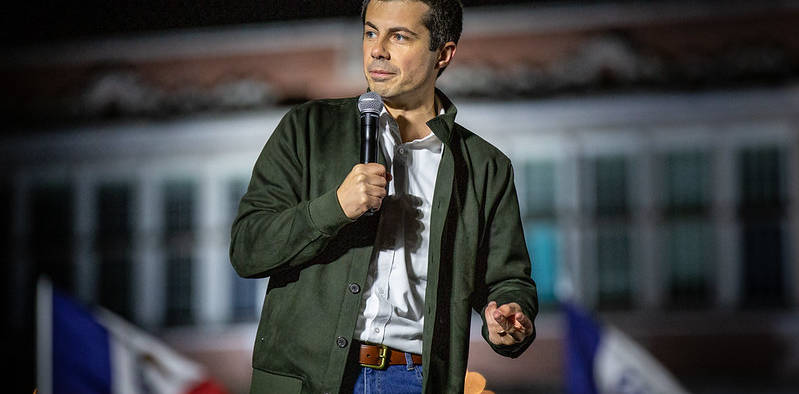America Needs More Than a Reboot

Mayor Pete wants a fresh start for America. Unfortunately, he doesn’t seem to grasp how fractured that America is, electorally speaking.
Pete Buttigieg promises “a fresh start for America.” Joe Biden vows, in this new United States, there will be “no malarkey.” Evidently, the best remedy for this country is the equivalent of rebooting one’s computer, or in the case of the former vice president, to reset our abacuses. Or is that abaci? Are both acceptable? But I digress.
In supporting the centrist figures of Buttigieg and Biden, establishment Democrats and party supporters seek a return to how it was under President Barack Obama. In this respect, life under Donald Trump can be considered an aberration. When one of these men is in the White House, all the racists and xenophobes will go back into hiding and Republicans will magically come to their senses, ready to reach across the aisle and work together with their Democratic colleagues.
Right.
If this sounds absurd—which it should—we shouldn’t be surprised that these men’s platforms lack substance next to some of their primary competitors. Biden’s “vision for America” is little more than a love note to the Middle Class, the “backbone of the country.” (If you had the phrase “backbone of the country” in your presidential campaign drinking game, let this be a reminder to take a drink.) Buttigieg pledges to lead us to “real action,” someone who will “stand amid the rubble” and “pick up the pieces of our divided nation.” Presumably, he will also assemble all the king’s horses and all the king’s men to put Humpty Dumpty together again.
What is therefore evident is that these candidates are relying on something other than polished policy to elevate them to a potential showdown with Trump for the presidency. Mayor Pete admittedly talks a good game. He’s clearly intelligent and has charisma. Uncle Joe, well, really wants to remind you that he worked with Obama. Never mind the apparent decline of his mental acuity or his vague creepiness. He’s a good guy. Just ask Barack. Obama, Obama, Obama.
Speaking of Obama, it is in this context that we might consider who the closest logical successor to his political legacy is still left in the 2020 presidential race. After all, concerning candidates of color, Kamala Harris just bowed out of the race, Cory Booker may be next, and Julián Castro doesn’t seem to be tracking all that well in the polls. Also, Beto O’Rourke, who isn’t a person of color but is handsome, speaks Spanish, and rides a skateboard (so, um, cool?) has already dropped out. Is there no one young and articulate enough to pick up where his Barack-ness left off?
In his bid for unity, Buttigieg, who has enjoyed a recent surge in polling, most notably among prospective Iowa voters, seems ready to take on that mantle. Here’s the thing, though: America and its politics are a different bag than when Obama first got ushered into the White House. Freelance journalist Zeeshan Aleem, in a recent piece for VICE, asks the question, “Can someone tell Pete Buttigieg he isn’t Barack Obama?” To this effect, he avers that the mayor of South Bend, Indiana’s “quest for unity is about as naive as Obama’s.”
For Aleem, Buttigieg’s persuasiveness overshadows his blandness from a policy perspective. There’s also the matter of his seeming naivete, as outlined in a few examples. Buttigieg, for one, advocates for an impeachment process that goes beyond politics, evidently unaware that this matter is already and perhaps inextricably linked to partisanship. He also, in fighting the likes of Bernie Sanders and Elizabeth Warren on Medicare for all, appears to think Republicans are willing to compromise on health care. For that matter, Mayor Pete seeks to avoid any talk or policy directive that might be construed as “polarizing.”
Again, Buttigieg looks to be missing the mark. In this moment, congressional Republicans are as likely to compromise as President Trump is to voluntarily leave Twitter. Besides, despite his own charm and charisma, Obama wasn’t able to make much headway in working with the GOP—with Mitch McConnell among party leadership, it’s not hard to see why either.
As Aleem explains, moreover, when deals were struck, they weren’t necessarily a significant win for the average voter. The Affordable Care Act’s origins were steeped in conservative thinking, did not include a public option, and did nothing to challenge the power of the private health insurance industry. Obama’s economic stimulus package featured a concession to Republicans in the extension of the previous administration’s tax cuts and, as many economists and critics on the left argued, did not go far enough because it didn’t ask for enough.
So, here comes Mr. Buttigieg, ready to try a page from Mr. Obama’s playbook. If Obama couldn’t make his ideas work then, though, it begs wondering what chance Buttigieg has owing to a political environment that has only become more polarized. Aleem writes in closing:
Buttigieg’s talk about breaking the shackles of hyperpartisanship and coming together to save the republic is seductive, but nothing about the way politics has been evolving for decades suggests that it’s a sound strategy. Like Obama, he relies on charisma and optimism to make such a future seem possible. But the hard realities of polarization cannot be vanquished solely by good intentions.
In an age when widespread unity is a political impossibility, fear of being polarizing isn’t just out of touch—it could be an act of self-sabotage.
To say we are a divided United States is an understatement. Such a synopsis likewise ignores that it’s not just that we share different opinions depending on where we fall along the political spectrum or how much we engage with politics, but that depending on our immediate circumstances, we may as well be living in different countries. Add the magnifying effect residence in insular political “bubbles” has on polarization and the problem becomes that much worse, with discourse guided by mutual distrust and a failure to be able to agree on what is even factually accurate.
Mayor Pete wants a fresh start for America. Unfortunately, he doesn’t seem to grasp how fractured that America is, electorally speaking.
Looming over the ultimate decision Democratic Party primary voters will have to make is the concept of “electability,” a word underscored by red squiggles in my browser as if to showcase just how nebulous a concept it is. In the minds of voters and pundits alike, Joe Biden’s and Pete Buttigieg’s electability is key to understanding their prominence in the polls. By this token, “electability” is effective code for “ability not to alienate a wide enough portion of the constituency so as to defeat Donald Trump this coming November.” In other words, these men are the presumed safe bets.
If the last few election cycles in the United States have taught us anything, however, it’s that our ideas about electability may be built on faulty premises. How many people would’ve considered a relatively inexperienced legislator from Illinois—a man of color by the name of Barack Hussein Obama, no less—”electable” at the start of his campaign? Next to an unpolished outsider like Donald Trump, wouldn’t we have viewed Hillary Clinton a more “electable” candidate given her career in Washington, D.C. and her name recognition? That’s certainly not how the script played out.
Depending on how far we want to take our abstract notions of electability, we have the potential to talk ourselves out of plenty of good—if not great—candidates. Does it matter that Buttigieg is an openly gay man and, like, Obama, lacks the political tenure of other primary competitors? What about Bernie Sanders’s identity as a Jewish democratic socialist? Elizabeth Warren continues to be heckled for her claim of Native American heritage. Is she un-electable? Was Kamala Harris, a woman of color, too “tough” to be electable prior to dropping out of the race? Who decides these matters? And how do you reliably measure such a mythical quality?
As a progressive, I tend to feel I am more sensitive than most to ideas about who is “electable” and what is politically “feasible.” A majority of Democratic Party primary voters and delegates decided HRC was the best choice in 2016, a presumption of electability likely aided by major media outlets including superdelegate numbers alongside pledged delegate totals in delegate counts. As noted, the final outcome didn’t quite go to plan.
What if Bernie had won, though? Would we still have been hemming and hawing about his electability or would the Democratic National Committee have gotten behind him, exhorting prospective general election voters with full-throated cheers? With the role of superdelegates diminished and with Sanders in a real position to the capture the nomination this time around given his fundraising capabilities and his place in the polls, considerations of his viability are yet more relevant. Surely, in the name of beating Trump, establishment Democrats would be eager to support him as someone who consistently beats the orange-faced incumbent in head-to-head polls, right? Right?
Along these lines, policy positions continued to be argued about in terms of their pragmatism. Rather, time after time, what is apparent is that various progressive causes are not lacking the specifics or the public support to be “realistically” workable, but the political will. On the subject of climate change, facing a wealth of evidence that humans’ use of fossil fuels is helping accelerate a threat to the future of life on this planet, many Americans favor a Green New Deal or some comparable plan to address this catastrophe in a meaningful way. It makes political and economic sense. The biggest obstacle evidently is not our desire, but our fealty to the fossil fuel industry and other prime pollutors.
Therefore, when it comes to presidential candidates, we would do well to abandon thoughts of who “the best bet” is or which candidate preaches “political unity” the hardest. Both concepts are, at their core, illusory. A better tack is to identify the candidate who best elaborates our values and what is best for the country and the world—not just their careers.
Joe Biden wants a return to a fabled time when Democrats and Republicans worked arm in arm, pitching a vision in cringe-worthy fashion of an America that was problematic in his heyday and hasn’t aged well. Pete Buttigieg wants a fresh start to set America back on track, emphasizing a reboot (Reboot-Edge-Edge?) over substantive change, to a time when we weren’t embarrassed by our president, but when things weren’t as rosy as our retrospective glasses might reveal.
What America really needs, meanwhile, is more than either of those plans. We need a revolution inspired by someone like Bernie Sanders or at least someone with the reformist mindset of an Elizabeth Warren to level the playing field between everyday Americans and corporations/the wealthiest among us. Accordingly, and when we tell our children to dream big, we need to follow our own advice.








To truly get the USA on the right track, both political parties — which in reality are nothing more than special-interest conglomerates — will have to go.
However, it’s the country that will go before the myopic special interests. Parasites that are fast killing the host organism!
Voters are stupid and ignorant . That’s why it works very well indeed for the few…for a while.